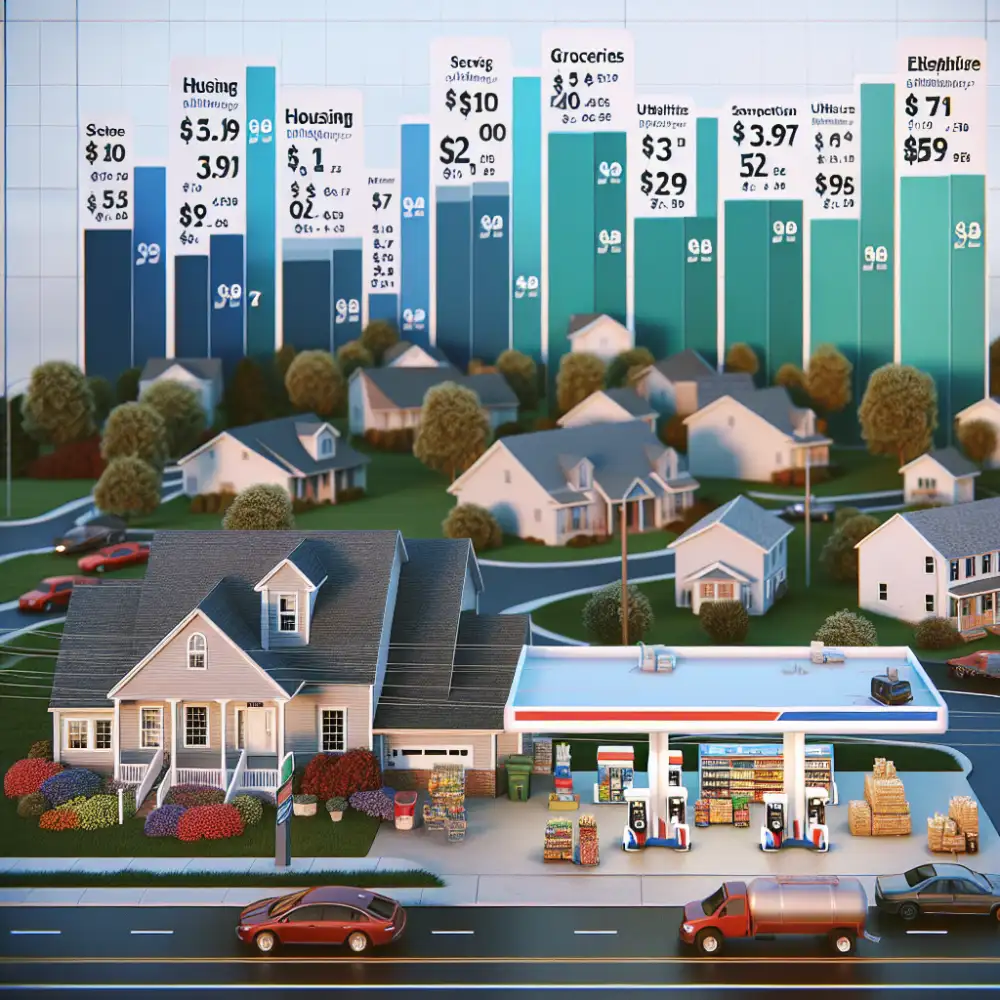Kentucky Living: Is It Affordable?

Housing Costs
Kentucky is known for its affordable living, and housing costs play a big role in that. Whether you're renting or buying, you'll find that your money goes further in the Bluegrass State compared to many other parts of the US.
Let's talk numbers. The median home value in Kentucky is significantly lower than the national average. This means you can find a comfortable and spacious home without breaking the bank. Renters, rejoice! Rental rates in Kentucky are also generally lower than the national average, whether you're looking for an apartment in the city or a house in a more rural setting.
Several factors contribute to Kentucky's attractive housing market. The state has a lower cost of living overall, which influences housing prices. Plus, Kentucky has a good supply of available housing, which helps keep prices competitive.
Of course, housing costs can vary depending on where you choose to live in Kentucky. The larger cities, like Louisville and Lexington, tend to have higher housing costs than smaller towns or rural areas. However, even within those urban areas, you can find affordable options.
When considering the cost of living in Kentucky, it's essential to factor in other expenses like utilities, transportation, and groceries. The good news is that these costs also tend to be lower in Kentucky compared to the national average.
In a nutshell, Kentucky offers a winning combination of affordable housing and a lower overall cost of living. This makes it an attractive place to live for individuals, families, and retirees alike. So, if you're looking for a place where your budget can stretch further, Kentucky is definitely worth considering.
Utilities
Kentucky is known for its relatively low cost of living, and utilities play a significant role in that affordability. Let's break down the typical expenses you can expect for essential utilities in the Bluegrass State.
Electricity
Kentucky residents enjoy lower electricity rates compared to the national average. The average monthly electricity bill is around \$130, but this can fluctuate depending on the size of your home, energy consumption habits, and the season.
Natural Gas
Natural gas is another widely used energy source in Kentucky, particularly for heating homes. The average monthly natural gas bill is approximately \$70, again with variations based on usage and home size.
Water
Water bills in Kentucky are generally quite affordable. You can expect to pay an average of \$45 per month for water and sewer services combined. Rates may vary slightly depending on your location and water consumption.
Internet and Cable
The cost of internet and cable services in Kentucky is comparable to national averages. You'll find various providers and plans, with prices ranging from \$60 to \$150 per month depending on your desired internet speed and cable package.

Trash and Recycling
Trash and recycling collection services are typically handled at the local level in Kentucky. Costs can range from \$15 to \$30 per month, depending on the frequency of collection and whether recycling services are included.
Overall Utility Costs
When you factor in all the essential utilities, you can anticipate spending approximately \$320 per month on average in Kentucky. This affordability in utilities contributes to the state's appeal for those seeking a lower cost of living without compromising on quality of life.
Transportation
Kentucky offers residents a variety of transportation options. The cost of transportation in Kentucky is lower than the national average.
Getting Around Kentucky
Kentucky is a rural state with a few large cities. If you live in a rural area, you will likely need to drive to get around. Public transportation is limited in most rural areas. The largest cities in Kentucky are Louisville, Lexington, and Bowling Green. These cities have public transportation systems that include buses.
Cost of Transportation
The cost of transportation in Kentucky is 12% lower than the national average.
Gas Prices: Gas prices in Kentucky are typically lower than the national average.
Car Insurance: Car insurance in Kentucky is also relatively affordable.
Public Transportation: Public transportation is very affordable in Kentucky. A one-way bus fare in Louisville, for example, is only $1.75.
Tips for Saving Money on Transportation in Kentucky
Live in a walkable neighborhood. If you live in a walkable neighborhood, you can save money on gas and car maintenance.
Take advantage of public transportation. Public transportation is a great way to save money on transportation costs.
Carpool. Carpooling is a great way to save money on gas and car maintenance.
Bike or walk. If you live close to work or school, consider biking or walking.
Overall, the cost of transportation in Kentucky is relatively affordable. There are a number of ways to save money on transportation costs, such as living in a walkable neighborhood, taking advantage of public transportation, and carpooling.
| Feature | Kentucky | National Average |
|---|---|---|
| Median Home Price | $195,000 | $295,000 |
| Average Rent (1 Bedroom Apartment) | $750 | $1,100 |
| Utilities (Electricity, Heating, Water) | $150 / month | $180 / month |
| Transportation (Gas, Public Transit) | $200 / month | $250 / month |
| Groceries | 90% of national average | 100% (baseline) |
| Healthcare | 95% of national average | 100% (baseline) |
Food
Kentucky is known for its affordable living, and food costs are no exception. Groceries in Kentucky tend to be cheaper than the national average. Expect to pay less for essentials like milk, bread, eggs, and meat compared to many other states. Dining out in Kentucky is also relatively affordable. Whether you are craving Kentucky classics like fried chicken or barbecue or prefer ethnic cuisine, you will find plenty of reasonably priced options. Numerous fast-food and casual dining restaurants offer budget-friendly meals. Farmers' markets are popular in many Kentucky towns and cities. These markets are great places to find fresh, locally grown produce, often at lower prices than supermarkets. Kentucky has a strong agricultural tradition, which contributes to the affordability of certain foods. The state is known for its bourbon, horse racing, and agriculture. Consider taking advantage of seasonal produce. Look for what is in season locally, as these items are often cheaper and fresher. Kentucky offers a good quality of life at an affordable price, and food costs are a significant factor in that affordability. Whether you are cooking at home or dining out, you will find that your food budget goes further in Kentucky.

Healthcare
Kentucky offers residents a generally affordable cost of living, and healthcare is no exception. When compared to the national average, Kentucky's healthcare costs are lower. This affordability extends across various healthcare services, including doctor visits, hospital stays, and prescription drugs.
Several factors contribute to Kentucky's favorable healthcare costs.
The state has a lower cost of living overall, which influences wages and operational expenses for healthcare providers.
Kentucky benefits from a strong network of medical schools and teaching hospitals. These institutions often provide lower-cost care as part of their training programs.
Kentucky has implemented policies to promote transparency in healthcare pricing. This allows consumers to compare costs and make informed decisions about their care.
While Kentucky's overall healthcare costs are lower than the national average, it's important to note that individual expenses can vary based on specific needs and coverage.
Factors like pre-existing conditions, insurance coverage, and location within the state can all impact healthcare expenses.
For individuals and families considering a move or living in Kentucky, the state's affordable healthcare landscape is a significant advantage.


It contributes to a lower overall cost of living, allowing residents to allocate their income to other essential needs.
However, staying informed about healthcare costs and exploring available resources is crucial to maximize affordability and access to quality care.
Taxes
Kentucky has a fairly moderate tax burden overall. Let's break down the main taxes that impact your wallet in the Bluegrass State.
Sales Taxes: Kentucky's base sales tax is 6%. This applies to most goods and services you buy. Be aware that some counties and cities might tack on additional local sales taxes, so the final rate can vary a bit depending on where you live.
Income Taxes: Kentucky has a graduated individual income tax system. This means the more you earn, the higher your tax rate. Rates currently range from 2% to 5%.
Property Taxes: Property taxes in Kentucky are relatively low, especially compared to other states. You'll pay property taxes if you own a home or land. The exact amount you owe depends on your property's assessed value and the local tax rates set by your county and city.
Cost of Living Impact: These moderate taxes contribute to Kentucky's overall affordable cost of living. While taxes are one factor to consider, remember to look at the bigger picture, including housing, healthcare, transportation, and other expenses. Kentucky generally boasts lower costs in these areas compared to many other parts of the US.
Average Salary
Kentucky is often praised for its affordability. While the average salary in Kentucky might seem modest compared to some states, it’s important to look at it in context. The median household income in Kentucky is around $52,000 per year. This figure represents the midpoint, meaning half of Kentucky households earn more, and half earn less. Now, let’s consider how this salary interacts with the cost of living. Kentucky consistently ranks well for affordability, particularly in areas like housing. Your dollar stretches further here. For example, the median home price in Kentucky is significantly lower than the national average. This means your housing costs, a major expense for most people, will likely be lower in Kentucky. This affordability extends to other areas as well. Groceries, utilities, and transportation costs in Kentucky tend to be lower than the national average. This means your overall expenses can be lower, allowing your salary to go further. Of course, salaries in Kentucky vary depending on your profession, experience level, and location within the state. Living and working in Kentucky presents a unique opportunity. You can enjoy a good quality of life without the high cost of living found in many other parts of the US.

Cost of Living Index
Kentucky is known for its affordable living, especially when compared to larger cities on the East and West Coasts. The cost of living in Kentucky is lower than the national average, making it an attractive place to live, work, and raise a family.
The overall cost of living in Kentucky is about 15% lower than the national average. Housing is particularly affordable in Kentucky, with the median home price significantly lower than the national average. This affordability extends to both urban and rural areas of the state.
While housing is a major factor, other expenses also contribute to Kentucky's affordability. Groceries, transportation, and healthcare costs are all lower than the national average. For example, you'll find that everyday items like groceries and gas tend to be cheaper in Kentucky compared to states with a higher cost of living.
Here's a closer look at some specific costs:
Housing: Expect to find a range of housing options, from affordable apartments to larger single-family homes, at prices below the national average.
Utilities: Energy costs in Kentucky are relatively moderate, contributing to lower overall utility bills.
Transportation: While Kentucky is a largely rural state, owning a car is often necessary. However, gas prices and car insurance rates tend to be lower than in many other states.
Healthcare: Kentucky's healthcare costs are lower than the national average, providing some relief for residents when it comes to medical expenses.
It's important to note that the cost of living can vary within Kentucky. Larger cities like Lexington and Louisville will generally have a higher cost of living than smaller towns or rural areas.
Overall, Kentucky offers an attractive combination of affordability and quality of life. If you're looking for a place where your budget stretches further, Kentucky is definitely worth considering.
Published: 19. 06. 2024
Category: finance



